Ditapis dengan
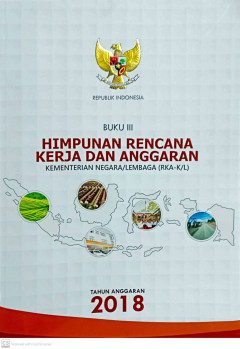
Buku III: Himpunan Rencana Kerja dan Anggaran Kementerian Negara/Lembaga (RKA…
Berdasarkan Undang-Undang Nomor 17 Tahun 2003 Tentang Keuangan Negara diatur bahwa dalam rangka penyusunan RAPBN, Menteri/Pimpinan Lembaga selaku Pengguna Anggaran / Pengguna Barang menyusun Rencana Kerja Anggaran Kementerian/Lembaga (RKA-K/L) tahun berikutnya. RKA-K/L tersebut disusun berdasarkan prestasi kerja yang akan dicapai dan disertai dengan prkiraan belanja untuk tahun berikutnya setel…
- Edisi
- -
- ISBN/ISSN
- -
- Deskripsi Fisik
- - p. : Illus. ; 29 cm
- Judul Seri
- -
- No. Panggil
- 352.3 REP H
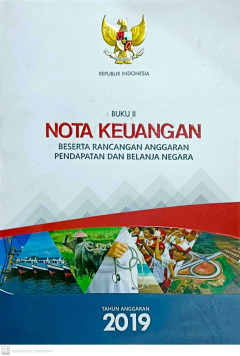
Buku II: Nota Keuangan Beserta Rancangan Anggaran Pendapatan dan Belanja Nega…
APBN tahun 2019 merupakan instrumen pelaksanaan strategi fiskal sekaligus sebagai penjabaran atas tahapan pembangunan tahunan terakhir dari RPJMN 2015-2019 yang memiliki Visi “Terwujudnya Indonesia yang Berdaulat, Mandiri, dan Berkepribadian Berlandaskan Gotong Royong”. Pembangunan nasional lima tahunan tersebut pada tahun ini diwujudkan dalam rencana kerja tahunan berupa Rencana Kerja Peme…
- Edisi
- -
- ISBN/ISSN
- -
- Deskripsi Fisik
- - p. : Illus. ; 29 cm
- Judul Seri
- -
- No. Panggil
- 352.48 REP N

Buku III: Himpunan Rencana Kerja dan Anggaran Kementerian Negara/Lembaga (RKA…
Berdasarkan Pasal 15 Undang-Undang Nomor 17 Tahun 2003 Tentang Keuangan Negara diatur bahwa dalam rangka penyusunan RAPBN, Menteri/Pimpinan Lembaga selaku Pengguna Anggaran / Pengguna Barang menyusun Rencana Kerja Anggaran Kementerian/Lembaga (RKA-K/L) tahun berikutnya. RKA-K/L tersebut disusun berdasarkan prestasi kerja yang akan dicapai, dan disertai dengan prakiraan belanja untuk tahun berik…
- Edisi
- -
- ISBN/ISSN
- -
- Deskripsi Fisik
- - p. : Illus. ; 29 cm
- Judul Seri
- -
- No. Panggil
- 658.401 REP H
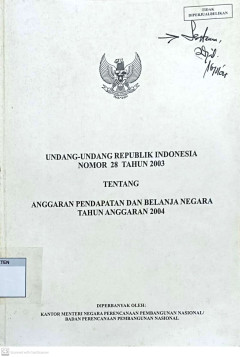
Undang-Undang RI Nomor 28 Tahun 2003 Tentang Anggaran Pendapatan dan Belanja …
Berisi Undang-Undang RI Nomor 28 Tahun 2003 Tentang Anggaran Pendapatan dan Belanja Negara TA 2004, 18 Pasal, ditandatangani oleh Presiden RI Megawati Soekarnoputri. (Jml)
- Edisi
- -
- ISBN/ISSN
- -
- Deskripsi Fisik
- - p. : Illus. ; 30 cm
- Judul Seri
- -
- No. Panggil
- 351.72 IND a
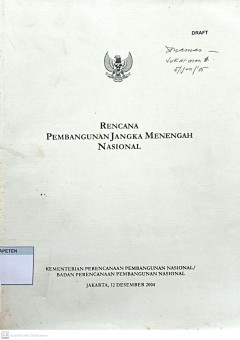
Draft Rencana Pembangunan Jangka Menengah Nasional
Berisi draft rencana pembangunan jangka menengah nasional meliputi : Bagian I: Permasalahan dan Agenda Pembangunan Nasional; Bagian II: Agenda Menciptakan Indonesia yng Aman dan Damai; Bagian III: Agenda Menciptakan Indonesia yang Adil dan Demokratis; Bagian IV: Agenda Meningkatkan Kesejahteraan Rakyat; Bagian V: Kerangka Ekonomi Makro dan Pembiayaan; dan Bagian VI: Penutup. (Jml)
- Edisi
- -
- ISBN/ISSN
- -
- Deskripsi Fisik
- - p. : Illus. 30 cm
- Judul Seri
- -
- No. Panggil
- 658.401 KEM R
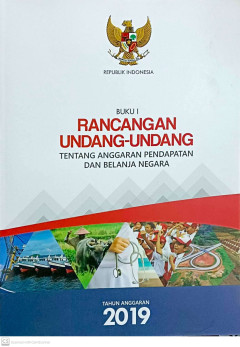
Buku I: Ranginess Undang-Undang Tentang Anggaran Pendapatan dan Belanja Negar…
Buku I Rancangan Undang-Undang Tentang Anggaran Pendapatan dan Belanja Negara tahun Anggaran 2019 ini memuat 46 pasal (Jml)
- Edisi
- -
- ISBN/ISSN
- -
- Deskripsi Fisik
- 36 p. : Illus. ; 29 cm
- Judul Seri
- -
- No. Panggil
- 352.48 REP N
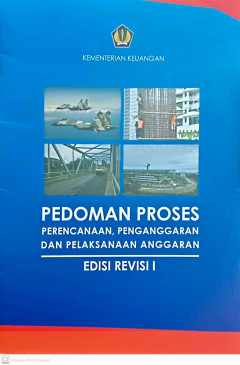
Pedoman Proses Perencanaan, Penganggaran dan Pelaksanaan Anggaran, Edisi Revi…
Kementerian Keuangan RI menerbitkan edisi revisi buku pedoman proses perencanaan, penganggaran, dan pelaksanaan APBN, sebagai pedoman umum bagi stakeholders untuk memahami proses perencanaan, penganggaran, dan pelaksanaan APBN yang menjadi tanggung jawabnya. Perbaikan dilakukan untuk menyesuaikan perkembangan regulasi di bidang keuangan negara.
- Edisi
- -
- ISBN/ISSN
- -
- Deskripsi Fisik
- 38 p. : Illus. ; 29,5 cm
- Judul Seri
- -
- No. Panggil
- 352.3 KEM P
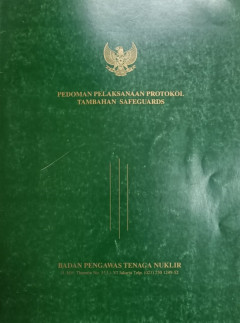
Pedoman Pelaksanaan Protokol Tambahan Safeguards
Pedoman ini dimaksud sebagai petunjuk untuk mengatur tata cara penyampaian deklarasi informasi yang dipersyaratkan protokol tambahan safeguards dengan tujuan mendeteksi kemungkinan adanya kegiatan nuklir yang tidak terdeklarasi
- Edisi
- -
- ISBN/ISSN
- -
- Deskripsi Fisik
- 73 p. : Illus. ; 29 cm
- Judul Seri
- -
- No. Panggil
- 539.7 BAP P
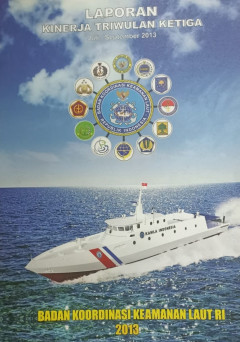
Laporan Kinerja Triwulan Ketiga Juli-September 2013 Badan Koordinasi Keamanan…
Laporan kinerja triwulan ini membahas diantaranya penyiapan kebijakan keamanan laut, koordinasi operasi keamanan laut, informasi, hukum dan kerjasama keamanan laut, dan kesekretariatan.
- Edisi
- -
- ISBN/ISSN
- -
- Deskripsi Fisik
- 112 p. : Illus. ; 29 cm
- Judul Seri
- -
- No. Panggil
- 351.1 BAD L
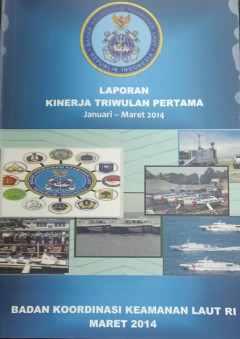
Laporan Kinerja Triwulan Pertama Januari-Maret 2014 Badan Koordinasi Keamanan…
Laporan kinerja triwulan ini memuat hasil capaian kontrak kinerja pada tahun anggaran berjalan yang terbagi ke dalam tiga periode, yakni triwulan 1,2, dan 3. Selanjutnya disusun menjadi LAKIP pada triwulan terakhir.
- Edisi
- -
- ISBN/ISSN
- -
- Deskripsi Fisik
- 53 p. : Illus. ; 29 cm
- Judul Seri
- -
- No. Panggil
- 351.1 BAD L
 Karya Umum
Karya Umum  Filsafat
Filsafat  Agama
Agama  Ilmu-ilmu Sosial
Ilmu-ilmu Sosial  Bahasa
Bahasa  Ilmu-ilmu Murni
Ilmu-ilmu Murni  Ilmu-ilmu Terapan
Ilmu-ilmu Terapan  Kesenian, Hiburan, dan Olahraga
Kesenian, Hiburan, dan Olahraga  Kesusastraan
Kesusastraan  Geografi dan Sejarah
Geografi dan Sejarah